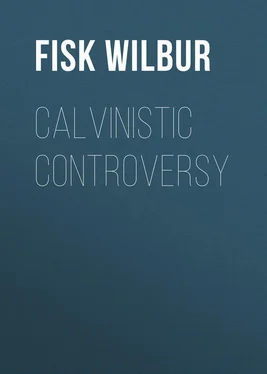Wilbur Fisk - Calvinistic Controversy
Здесь есть возможность читать онлайн «Wilbur Fisk - Calvinistic Controversy» — ознакомительный отрывок электронной книги совершенно бесплатно, а после прочтения отрывка купить полную версию. В некоторых случаях можно слушать аудио, скачать через торрент в формате fb2 и присутствует краткое содержание. Жанр: foreign_antique, foreign_prose, на английском языке. Описание произведения, (предисловие) а так же отзывы посетителей доступны на портале библиотеки ЛибКат.
- Название:Calvinistic Controversy
- Автор:
- Жанр:
- Год:неизвестен
- ISBN:нет данных
- Рейтинг книги:4 / 5. Голосов: 1
-
Избранное:Добавить в избранное
- Отзывы:
-
Ваша оценка:
- 80
- 1
- 2
- 3
- 4
- 5
Calvinistic Controversy: краткое содержание, описание и аннотация
Предлагаем к чтению аннотацию, описание, краткое содержание или предисловие (зависит от того, что написал сам автор книги «Calvinistic Controversy»). Если вы не нашли необходимую информацию о книге — напишите в комментариях, мы постараемся отыскать её.
Calvinistic Controversy — читать онлайн ознакомительный отрывок
Ниже представлен текст книги, разбитый по страницам. Система сохранения места последней прочитанной страницы, позволяет с удобством читать онлайн бесплатно книгу «Calvinistic Controversy», без необходимости каждый раз заново искать на чём Вы остановились. Поставьте закладку, и сможете в любой момент перейти на страницу, на которой закончили чтение.
Интервал:
Закладка:
These, candid hearers, are some of the objections we have to this doctrine – objections so serious, and, as we think, so obvious, that you may well ask, What has induced good men to advocate it so long? It is, doubtless, because it stands connected intimately with the doctrine of unconditional election, and what have been called by Calvinists “the doctrines of grace.” But for unconditional election, predestination would not be desired, even by those who now hold to it; and but for predestination, unconditional election could not be maintained. Hence these have very properly been called “twin doctrines,” and must stand or fall together. Let us pass then to the next proposition.
II. We come to examine predestination in its particular relation to election.
Several kinds of election are spoken of in the Scriptures. There is an election of individuals, to perform certain duties appointed by God: – thus Christ was God’s elect, for the redemption of the world; and Cyrus was elected by him to rebuild the temple. There is an election of whole communities and nations to the enjoyment of certain peculiar privileges, political and ecclesiastical, relating of course to this life: – thus Jacob and his descendants were God’s chosen people, to the enjoyment of religious and national privileges, from which Esau and his descendants, together with the whole Gentile world, were excluded; and thus, too, subsequently, the middle wall of partition, made by the former decree of election between Jew and Gentile, being broken down, the Gentiles became equal sharers with the Jews in the privileges of the new covenant, called the “election of grace.” This election is unconditional, and is believed to be the one spoken of in our text, and many other passages of Scripture. Of these, however, I shall speak more particularly in another place.
There is a third election – an election unto eternal life, and this is the one which has given rise to the great controversy in the Church. – Those who contend for predestination, as objected to by us, maintain that, “By the decree of God, for the manifestation of his glory, some men and angels are predestinated unto everlasting life, and others foreordained to everlasting death. Those of mankind that are predestinated unto life, God, before the foundation of the world, hath chosen in Christ, unto everlasting glory, without any foresight of faith or good works .” Others, and this also is our doctrine, hold that “God did decree from the beginning, to elect, or choose in Christ, all that should believe unto salvation, and this decree proceeds from his own goodness, and is not built on any goodness of the creature; and that God did from the beginning decree to reprobate all who should finally and obstinately continue in unbelief.” Thus it is seen, from the statement of the two doctrines, that ours is an election of character, and so far as it relates to individuals, it relates to them only as they are foreseen to possess that character; whereas the other relates directly to individuals, without any reference to character. It is an absolute act of sovereignty – God elects them for no other reason or condition than because he chooses. He makes no account of man’s agency or responsibility in this decree of election, but it precedes and is entirely independent of any knowledge of the character of the elect. Our views of election, on the contrary, make it conditionally dependent on the responsible agency of man. In the one case, the sinner is made to receive Christ, because he is elected; and in the other, he is elected, because he receives Christ. From this difference, too, proceed other differences. The Calvinistic election, to be consistent with itself, requires that, as the end is arbitrarily fixed, so the means must be also – hence the doctrines of irresistible grace, effectual calling, and infallible perseverance. Calvinian election, therefore, stands intimately allied to Calvinian predestination; and the whole forms a chain of doctrines differing materially from ours. And here we acknowledge we have a position to prove as well as our opponents. We assert that election to eternal life is conditional; they, that it is unconditional. We will first attempt to prove our position – then state and answer the arguments in favour of unconditional election – and finally, urge some objections against unconditional election and reprobation.
1. Our first argument in favour of conditional election to eternal life, is drawn from the position already established, that the decrees of God are predicated on his foreknowledge. And especially, that the decree of election to salvation, according to the Scriptures, is founded on the Divine prescience. “Elect according to the foreknowledge of God, through sanctification of the Spirit unto obedience, and sprinkling of the blood of Jesus Christ.” “Whom he did foreknow, he also did predestinate, to be conformed to the image of his Son.” These scriptures seem to us decisive, that the decree of election rests on foreknowledge, and that this election is made, not according to the arbitrary act of God, but on the ground of sanctification and obedience. The doctrine, therefore, that men are predestinated to eternal life, “without any foresight of faith or good works,” must be false.
2. The rewardableness of obedience, or the demerit of disobedience, can only exist in connection with the unnecessitated volitions of a free moral agent. The Scriptures abundantly teach, that to be saved, man must believe and obey; and hence they command and exhort men to believe and obey, and promise them the reward of eternal life if they do this, and criminate them, if they neglect it. But, according to the doctrine of free agency already explained, man’s obedience or disobedience, if it has any just relation to rewards and punishments, must rest, in its responsible character, upon the self – determining principle of the will. And if this view of the will be correct, there is an utter impossibility of an unconditional election. For the very act of God, imparting this self-determining principle to man, renders it impossible, in the nature of things, for the Almighty himself to elect a moral agent, unconditionally. The argument stands thus – The Scriptures make man a responsible moral agent; but this he cannot be, if his will be controlled by foreign and unavoidable influences, therefore it is not so controlled: that is, man has within himself a self-determining principle, in the exercise of which he becomes responsible. This being established, we argue again – The doctrine of unconditional election necessarily implies irresistible grace, absolutely impelling and controlling the will. But this would be to counteract God’s own work, and to destroy man’s accountability; therefore there is no such irresistible grace, and, of course, no such unconditional election. And since there is an election to eternal life, spoken of in the Scriptures, it follows conclusively, if the foregoing reasoning be sound, that this election is conditional. – Hence we may bring forward, in one overwhelming argument, all the numerous and various Bible conditions of salvation, as so many Scripture proofs of a conditional election.
3. The cautions to the elect, and the intimations of their danger, and the possibility of their being lost, are so many Scripture proofs of a conditional election. Why should the saints be exhorted “to take heed lest they fall?” “lest there be in them an evil heart of unbelief, in departing from the living God?” “lest a promise being left of entering into rest, any should come short?” lest they should “also be cut off?” Why should St. Paul fear lest, after having preached to others, he should be a castaway? Either there is, or is not, danger of the elect’s being lost. If not, then all these passages are not only without meaning, but savour very strongly of deception. They are false colours held out to the elect, for the purposes of alarm and fear, where no fear is. Will it be said, that possibly some of those addressed were not of the elect, and were therefore deceiving themselves, and needed to be cautioned and warned? I answer, they had then nothing to fall from, and no promise of which to come short. Besides, to warn such to stand fast , seems to imply, that the Holy Spirit cautioned the reprobates against the danger of becoming the elect, which idea, while it intimates a very ungracious work for the “Spirit of grace” to be engaged in, clearly indicates, that there was danger of breaking the decree of reprobation! We ask again, therefore, What do these scriptures mean? Will it be said, as some have argued, that these warnings and cautions are all consistent, because they are the very means by which the decree of election is made sure? But let it be understood, that the end is fixed, before the means; because Calvinism tells us, that this election is “independent of any faith or good works foreseen,” and that “God’s decree lays a necessity on all things, so that every thing he wills necessarily comes to pass,” and is therefore sure, “because he has decreed it.” The moment, therefore, God decrees an event, it becomes sure, and to talk of danger of a failure in that event, implies either a falsehood, or that God’s decree can be broken . But Calvinists, I presume, will not allow that there is any danger of counteracting or frustrating the plan of the Almighty. Hence there is no danger of the elect’s coming short of salvation. All the exhortations, cautions, and warnings therefore, recorded in the Scriptures, are false colours and deceptive motives. They are like the attempts of some weak parents, who undertake to frighten their children into obedience, by superstitious tales and groundless fears. God knows, when he is giving out these intimations of danger, that there is no such danger; his own eternal, unchangeable decree had secured their salvation before the means were planned – all this if election is unconditional. But far be this from a God of truth. If he exhorts his creatures to “make their election sure,” he has not made it sure. – If he teaches them to fear, lest they fail of the grace of God, there is doubtless real danger. The conclusion therefore is irresistible, that Cod hath suspended his decree of election to eternal life, on conditions; “He that believeth: shall be saved.”
Читать дальшеИнтервал:
Закладка:
Похожие книги на «Calvinistic Controversy»
Представляем Вашему вниманию похожие книги на «Calvinistic Controversy» списком для выбора. Мы отобрали схожую по названию и смыслу литературу в надежде предоставить читателям больше вариантов отыскать новые, интересные, ещё непрочитанные произведения.
Обсуждение, отзывы о книге «Calvinistic Controversy» и просто собственные мнения читателей. Оставьте ваши комментарии, напишите, что Вы думаете о произведении, его смысле или главных героях. Укажите что конкретно понравилось, а что нет, и почему Вы так считаете.












